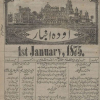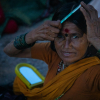Maulana Wahiduddin Khan
Sahapedia: Maulana ji, perhaps to start with you could tell us a little about the significance of Ramzan and Eid ul Fitr, as given in the Quran and later commentaries and interpretations?
Maulana Wahiduddin Khan: If you read the Quran, you will find that basic purpose of Ramzan, that is fasting, is given in the Quran as ‘taqwa’. Taqwa means god fearing. And the other word that is used in the Quran is ‘shukr’, that is thanksgiving. These are the two basic values. Because when you observe fasting you experience the high value of food and water. You experience that without food and without water it is not possible to live. So this creates Taqwa.
Then the other aspect is Shukr, that is thanksgiving. So when in the evening you break your fasting, then you feel that how important these items, basics. So both are interconnected. As one aspect it is Taqwa and the other aspect is Shukr.
Then the third word is used in the Hadiths. In the Hadiths the Prophet says, ‘Shahr es Sabr’. ‘Shahr es Sabr’ means that Ramzan is the ‘month of patience’. It is very clear that fasting is an act of patience. So these three values are mentioned in the Quran and Hadiths: Taqwa, Shukr and Sabr.
So the purpose of Ramzan, when one observes fasting, is to inculcate these three values in every believer: God fearing, spirit of God fearing, spirit of thanksgiving and spirit of patience.
Sahapedia: Thank you. I wished to clarify some doubts: though not articulated explicitly in the Quran-e-sharif, is there the idea that experiencing suffering, experiencing deprivation, can lead to understanding, sympathy for fellow human beings? And purification, is that also one of the principles?
Maulana: Yes, yes….In Quranic terms, it is ‘Tazkiyah’. This also is one aspect of Ramzan, to purify your soul. Purification means to try to inculcate positive values instead of negative. That is purification.
Sahapedia: The way people speak of sukoon or shaant. And of course there is the practice of giving fitra at Eid. Sir, could you talk a bit about Eid ul Fitr?
Maulana: Eid ul Fitr is not mentioned in the Quran, it is mentioned only in the Hadiths. Eid ul Fitr means ‘Eid of breaking the fast’. When you break your fasting, then it is Eid ul Fitr. So Eid ul Fitr is part of Islam, but it is not mentioned in the Quran, it is mentioned in the Hadiths.
Sahapedia: Would you like to tell us, is there any way in which how people have observed Ramzan and Eid has changed from the early years of Islam as Islam became part of different cultures? The way, say the architecture of mosques I believe changed over time?
Maulana: Repeat your question
Sahapedia: Have there been rituals, practices or customs that have entered Ramzan and Eid over time, over the history of Islam?
Maulana: I don’t think that history has any function in these customs. All these things are prescribed in the Hadiths, basically in the Hadiths, also in fiqh and maybe there are some minor things in terms of culture that are part of history. Otherwise Ramzan and Eid, both do not develop during history. All these things are given as commandments in the Quran, in the Hadiths basically, and then it was codified in fiqh. I don’t think that history has any role in these customs. Maybe some minor aspects, there may be some role, but basically it is what is mentioned in the Quran and Hadiths. We observe Quran and Hadiths. We don’t follow any history.
Sahapedia: Many poets and writers have spoken about Ramzan and Eid, what it means to them as either in terms of spiritual meditation or celebration. We were wondering if you could tell us about that, about how they speak about what Ramzan means to them in essays or autobiographies or poetry?
Maulana: This is a very interesting question but I don’t know that literature has any role in this. These are religious customs. If there is some mention in literature, that is not an authentic reference. For example, there is a line in Persian that says:
Tan parvariye khalq, fuzun shudd za riyazat
Juz garmiye iftaar, nadarad ramzaan heich
So it a critical remark, that people know only eating, they eat and drink, they have forgotten the spirit. It is a critical remark. As far as the basic form is concerned, it is prescribed in the Quran and Hadiths. And some detail you can find in the fiqh. As far as literature is concerned, I don’t know that literature has any part in these customs.
Sahapedia: Could you speak about the details in the fiqh?
Maulana: There are three references in Islam. The Quran gives us the basic teachings. Then there are more details in the Hadiths. Then there are more details in fiqh. Fiqh means the codification of Islamic commandments. Muslims follow these three, Quran, Hadiths, fiqh. The Quran gives us basic principles, Hadiths gives us some more details, and fiqh gives us codifications for all these customs and rituals.
Sahapedia: Could you tell us about your own personal memories perhaps, your recollections of your childhood?
Maulana: I was born in a village in UP and at that time life was very simple, very very simple. But now I am living in the capital, and in the capital people have enough money, so there are so many additions. But basically Ramzan and Eid are one and the same, there is no difference in the basic structure. If there are some things, they are part of geography or part of custom but that is not part of Islam. I don’t remember anything that was quite different from daily life, I don’t remember such things, except some more items in terms of food or some more items in terms of dress but as far as the basic customs, it is the same.
Sahapedia: They would decorate, light up the city, I don’t know whether that is done in villages?
Maulana: Yes, that is not part of Islam, it is part of culture. The difference in these terms, but I would say that is not part of Islam, it is part of culture and you can see difference in these terms. For example, in Africa there is a different culture, in Europe there are different cultures, in Arabia different cultures. For example, in India we eat sevaiyan but in Arabia, they use something else. So there is a difference but all these differences are part of culture, not part of Islam. In terms of Islam, they are one and the same.
Sahapedia: May we ask you about cultural differences you have observed?
Maulana: Yes, cultural differences are there in every country. Cultural difference means the differences due to geography. There are geographical differences, so there are differences in culture. It is but natural. Although it is allowed, it is permissible, but it is not part of Islam.
Sahapedia: Would you like to talk about cultural differences in the way Ramzan and Eid are celebrated, that you have seen in different parts of India or different parts of the world?
Maulana: For example, we break our fasting by taking dates but it is not part of Islam, it is part of culture. And if you travel in Africa and Europe, you will find some other things, not dates. And some people break their fast by zamzam, but it is not part of Islam. Then in some countries you find that they wear some special dress when they visit mosque but it is not part of culture. In Arabia, the dress is quite different. In Europe, in America, they wear coat-patloon, but in Arabia it is not [like that]. So all these things are differences in culture, and culture is a product of geography. This turban, this is my personal choice. This is not Islamic choice but personal choice. Some people may wear a hat, some people a cap but my choice is a turban. So it is not part of Islam. It is part of personal choice. I think the basic factor behind all these cultural differences is geography.
Sahapedia: Could you tell us more about the spiritual practices during Ramzan, like the last 10 days when people go to the mosques and meditate?
Maulana: You mean Eitekaf. ‘Eitekaf’ literally means going into seclusion. So it is not obligatory, but some people if they have enough time, they practice Eitekaf. Eitekaf means staying in the mosque for 10 days, maybe less than 10 days. During Eitekaf they recite Quran and Hadiths, Salat, they do no special practice, the same practice. When we are out of Eitekaf, we read Quran, we perform Salat (worship). So there is no basic difference between [being in] Eitekaf and outside of Eitekaf.
Sahapedia: Would you tell us about Laylat al-Qadr?
Maulana: Yes, it is mentioned in the Quran. We generally call it Shab-e-Qadr. Shab-e-Qadr or Laylat al-Qadr literally means, ‘Night of Destiny’. So the belief is that on this night God Almighty destines the future of people. So people generally try to worship more, so that they invoke God Almighty. But in the Hadiths there is not any special worship on Laylat al-Qadr. For example, it is there in the Hadiths that Aisha, the wife of the Prophet, asked, ‘O Prophet, if I found Laylat al-Qadr, then what am I to do? Prophet said, pray this dua:
Allahumma innaka ‘afuwwun tuhibbul-’afwa fa’fu ‘anni
It is a very simple dua, ‘O God! forgive me.’
So Laylat al-Qadr is not something mysterious. It is only to make dua, to perform some worship. There is no mystery in Laylat al-Qadr.
Sahapedia: Is it true Ramzan is a blessed time for people for people to die, they are more likely to go to heaven?
Maulana: It is a myth. It is not mentioned in the Quran or Hadiths, it is a myth. There are so many myths. It has nothing to do with Islam.
Sahapedia: The choice of spelling, ‘Ramadan’/‘Ramazan’ has in recent years raised questions in Pakistan about ‘Arabisation’ and western hegemony (Zahra Sabri, Tribune, Sep. 8, 2011), and on the other hand about restricting the identities of Indian Muslims (Irena Akbar, Indian Express, July 19, 2014). Would you like to comment?
Maulana: I would say that Arabization, [questions of] the spelling of ‘Ramadan’, [or] saying ‘Allah Hafiz’, these things are not part of Islam. Not at all. It is extremism. And extremism is not allowed in Islam. In every religion there are extremists. That is Ghulu, the Islamic term for extremists is ‘Ghulu’. So there is a Hadith that there is no Ghulu in Islam, there is no extremist in Islam.
I would like to clarify one point, that there are two parts of Islam. Ideology and culture. In terms of ideology, there is no diverse version, only one version that is mentioned in the Quran. In terms of ideology there is no diversity. What is mentioned in the Quran, it is Islam forever.
But people live in different countries, different geographies. So due to this difference, there are different cultures. So in culture always there are differences. Even in Arab countries, culture is not one and the same. So if there are differences in culture, that is allowed, but no one can insist that this is right, this is wrong. You have no right to criticize, to insist, that is Ghulu. So in Islam, ideology is permanent. Ideology is eternal, but culture has no such—in culture there are always diversities. By culture I mean, dress and food and way of living and also greeting, all these things are part of culture. So Islam allows differences in terms of culture. But extremist people, they insist, this is right, this is wrong. That kind of insistence is against the spirit of Islam.
Shia kills Sunni, Sunni kills Shia, that is called un-Islamic. But there is no Mufti who issues a fatwa, saying that is un-Islamic. But if you say, ‘Khuda Hafiz’ instead of ‘Allah Hafiz’, ‘Ah, it is un-Islamic!’ That is not un-Islamic, what is un-Islamic is to kill people.
In Islam there is freedom of expression. Islam gives you freedom of expression. There is no such law in Islam that one who abuses God, abuses the Prophet, [you say], ‘Kill him.’ There is not.
Sahapedia: May I ask you about freedom of expression is it is spoken about in Islam? Is there any reference in the Quran-e Sharif?
Maulana: In Islam, freedom of expression is allowed in the extremest sense of the word. Only one thing is taboo, and that is physical harm. Otherwise you are free. If you use only words, and you are expressing your differences in harsh terms, it is allowed, unless you use harm; what is haram in Islam is physical harm. Freedom of expression is allowed, there is no restriction at all.
In the Quran I will cite a very interesting reference. When God Almighty created Man, at that time there were two creatures, jinns and man, three, angels, jinns and man. So God Almighty ordered that those two, the jinns and angels, must bow before Adam, before Man. No, I forgot, the reference you can find in Chapter Two of the Quran. When God Almighty declared, ‘I am going to create a new creature, that is Man’, the angels said, ‘Oh God, why are you creating a new creature? We are enough.’ So it was dissent, the angels show dissent, and God allowed that dissent. God only clarified the basic wisdom behind God’s creating a new creature. He never said that you have no right to differ from my reason.
So God Himself has established a precedent that everyone has the right to [dissent].
The basic point is that in Islam there is only one source, that is the Quran. There are not two sources, only one source. And in the Quran there is no such commandment that no one has the right to abuse the Prophet, if he abuses him he will be killed. There is no such commandment. It is in the fiqh, not in the Quran and not in the Hadith. In the fiqh there is such a provision. But I have published a book that this provision in fiqh is not right, it is against the Islamic spirit. I have published a book, Shatm-e Rasul ka Masal, Quran wa Hadith aur Fiqh wa Tarikh ki Roshni Mein [‘The Question of Blasphemy against the Prophet in the Light of the Quran, Hadith, Fiqh and History’, 1997]. So I admit that in fiqh you can find this provision. But not in the Quran, nor in the Hadith. The authentic source in Islam is only the Quran and the Hadith. If there is some provision in the fiqh, you have to judge it in the light of the Quran and the Hadith.
Sahapedia: Could you tell us if you feel other festivals—Milad un Nabi, Basant or Hazrat Ali’s birthday—should also be seen as important?
Maulana: Yes. In Islam, there are only two festivals, Id ul Fitr and Id ul Azha. All other festivals are part of the culture of the Muslim community. They have no mention in the Quran and Hadith. All those festivals, like Milad un Nabi and so many things, they are part of culture, not part of Islam. In the Quran and Hadith, there are only two festivals.
Sahapedia: May we ask you what you feel about women praying with men in mosques, in congregational gatherings?
Maulana: Yes, it is a very good question. Women are allowed to go the mosque and offer their prayers. There is no restriction at all. And it was a general practice during the Prophet that women used to go to mosques. And even today if you go to Mecca and Medina. In Haram—there are two great mosques in the Muslim world, that is Haram-e Makkah and Haram-e Madinah. These two are very huge buildings. So in these two buildings, women visit daily. They offer Ishraq everyday. But in India, in Pakistan and perhaps in Bangladesh there are some restrictions. But these restrictions are imposed by Muslims, not by Islam. I always say that you have to differentiate between Islam and Muslims. You have to judge Muslims in the light of Islamic teachings, and not vice versa.











